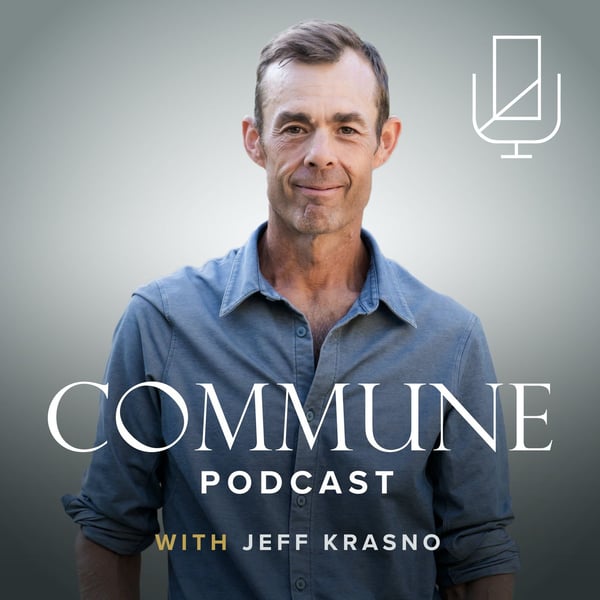449. How to Be Happy: the Secrets, the Myths and the Science with Robert Waldinger, MD
Commune with Jeff Krasno
Commune Media
4.6 • 654 Ratings
🗓️ 22 June 2023
⏱️ 93 minutes
🧾️ Download transcript
Summary
For over eight decades, Robert Waldinger, MD, directed the Harvard Study of Adult Development, taking hundreds of measurements—from brain scans to blood work—with the goal of discovering the secrets to a good life. In this episode, we explore common myths, including the age-old adage “money can’t buy happiness.” Learn what the three main categories of happiness are, the importance of good health and relationships, and practical ways to lead a happier and more fulfilling life.
In this episode we cover: 0:06:15 – Harvard Study of Adult Development
0:11:42 – Definition of Happiness
0:20:36 – An Unhappy Mind
0:23:52 – Zen Meditation
0:29:03 – Negative Memories
0:40:18 – Myths About Happiness
0:42:39 – Does Money Bring Happiness?
0:47:28 – Comparison
0:54:50 – Good Health and Happiness
0:55:40 – Number One Determinant for Happiness
1:00:51 – Relationships and Happiness
1:16:08 – Happiness Practices
1:17:45 – Repairing Broken Relationships
1:22:13 – Philanthropy and Happiness
Learn more about Commune and check out all our health, nutrition, and functional medicine courses free for 14 days at onecommune.com/trial
Transcript
Click on a timestamp to play from that location
| 0:00.0 | Welcome to the Commune podcast. |
| 0:10.5 | My name is Jeff Krasno. |
| 0:12.2 | Today on the show, I welcome Robert Waldinger. |
| 0:15.7 | Dr. Waldinger is a professor of psychiatry at Harvard Medical School and director of the Harvard Study of |
| 0:23.2 | Adult Development, which informed the writing of his recent book, The Good Life, Lessons from |
| 0:30.6 | the World's longest scientific study on happiness. He is also a Zen master or a Roshi who teaches meditation. Now the Harvard study of |
| 0:42.1 | adult development is considered the world's most thorough longitudinal study on human happiness. |
| 0:48.5 | For over eight decades, the study has tracked the same individuals and their progeny asking |
| 0:56.8 | thousands of questions and taking hundreds of measurements from brain scans to |
| 1:01.2 | blood work with the goal of discovering what really makes for a good life so |
| 1:08.2 | Bob and I cover the two main categories of happiness, hedonic well-being, |
| 1:14.4 | also known as moment-to-moment happiness or pleasure, and eudaimonia, a Greek term, |
| 1:21.4 | which points to a broader sense of life being worthwhile and having meaning. And we get into the importance of flow state, |
| 1:31.4 | the integration of intention and action, and the importance of letting go and being present |
| 1:38.1 | in order to experience happiness. We discuss Bob's experience as a practitioner of Zen meditation, and why studies show |
| 1:47.5 | that a wandering mind is often an unhappy mind. We discuss the relationship between money and happiness, |
| 1:56.6 | between forgiveness and happiness, and between altruism and happiness. We probe the |
| 2:04.0 | bidirectional relationship between good health and a good life, where good health contributes to |
| 2:11.2 | happiness and conversely, how being in a better mood actually promotes better health. And drum roll please, Bob reveals |
| 2:21.0 | the number one determinant for self-reported well-being, according to over 80 years of research. |
| 2:28.2 | Now this was a fascinating conversation that held many surprises for me, and I hope you enjoy it. But before we dive in, |
| 2:37.6 | I want to let you know about some of our programs over on the Commune course platform. If you |
... |
Please login to see the full transcript.
Disclaimer: The podcast and artwork embedded on this page are from Commune Media, and are the property of its owner and not affiliated with or endorsed by Tapesearch.
Generated transcripts are the property of Commune Media and are distributed freely under the Fair Use doctrine. Transcripts generated by Tapesearch are not guaranteed to be accurate.
Copyright © Tapesearch 2025.

